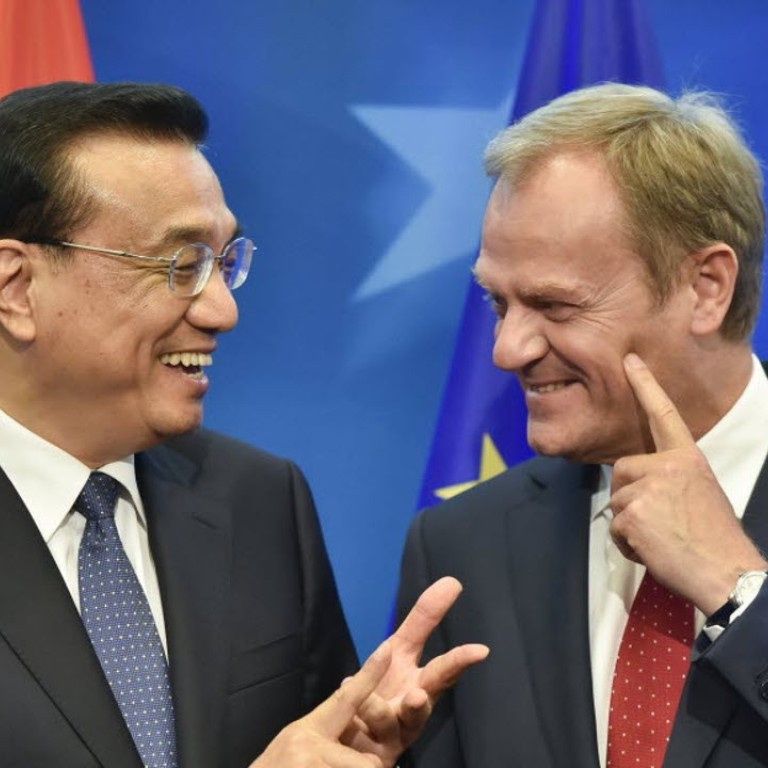
China knocks on the door of Europe’s free market club
When members of the European Union sat down in Brussels yesterday, there was just one item on the agenda.
The representatives of the 28 member states met to begin discussions on whether China should be granted market economy status, beginning the end of years of deliberation on the issue.
A decision is not expected until February but if the status is granted, from December China would be able to protect its exporters from paying high punitive tariffs in anti-dumping cases.
A yes from the EU members is not likely to have a major impact in the short run but it would put China in a stronger position to realise its bigger goal: to influence global trade rules.
The outcome of the talks is far from certain. At the centre of the debate is whether China’s economic performance qualifies it for the status to come into effect at the end of this year.
READ MORE - Market economy debate really about anti-dumping shenanigans
Beijing has long argued that it does but the EU insists that China should first meet five criteria: low government influence in the economy, an unfettered private sector, effective implementation of company law with adequate corporate governance rules, proper functioning of a free-market economy, and a genuine financial sector.
An EU assessment in 2008 found that China fell short of all but one of the criteria. Seven years later, a study by the European Parliament said China had achieved “impressive steps” towards a more open economy but “state economic intervention remained great”. The study cited the government intervention in the stock market in the summer as a sign that Beijing “is capable of reversing its market-based achievements and even of increasing state intervention in the economy on an ad hoc basis”.
But market economy status is more than a question of economics; it’s a political issue.
That’s why the EU, and the US granted the status to Russia in 2002, according to Wei Jianguo, secretary general of the China Centre for International Economic Exchanges. The deals were sealed when diplomatic ties with Russia were still in a honeymoon period.
“The extent of [Russia’s] market economy, even today, lags far behind China’s,” Wei said.
The extent of [Russia’s] market economy, even today, lags far behind China’s
For many of the EU member states, the debate hinges on concerns about potential losses of jobs and competitiveness.
The United States has reportedly pressed the EU to reject China’s application, warning of a flood of cheap Chinese goods.
Robert Scott and Xiao Jiang from the US-based Economic Policy Institute estimated that China’s exports of manufactured commodities to the EU would increase by up to €142.5 billion (HK$1.2 trillion) in the first three to five years after a yes vote. Those exports would increase the EU’s trade deficit and reduce GDP by up to 2 per centover that period.
“An EU decision to unilaterally grant market economy status to China would put between 1.7 million and 3.5 million EU jobs at risk by curbing the ability to impose tariffs on dumped goods and thus allowing Chinese companies to undercut domestic production by flooding the EU with cheap goods,” Scott and Jiang said.
But Frank Tang, an economist with North Square Blue Oak, said the increase in China’s exports to the EU might not be as big as many expected and the trade bloc would still be able to bring down non-trade barriers – such as security and human rights requirements – to ward off dumping.
Dumping has been a repeated source of tension between China and the EU. The bloc launched 119 anti-dumping probes and imposed 85 anti-dumping measures against Chinese products from 1995 and 2014, according to EU data. Just last month the EU announced it was extending anti-dumping measures on China’s photovoltaic products, two years after it announced punitive tariffs on China’s photovoltaic exports.
READ MORE - ‘Difficult to predict’: German ambassador on China’s bid for market economy status with EU
The sector’s exports to the EU slumped and it was forced to shift its attention to emerging markets.
These days, though, China is not as dependent on exports and its growing middle class represents an opportunity for European companies. China is working to expand imports and generate growth by spurring domestic demand.
“China is not heavily reliant on export markets anymore, even though it needs to take some time to solve domestic issues such as retiring obsolete capacity and deleveraging,” Wang Yiwei, head of Renmin University’s European studies centre, said.
China is also not content to sit back anymore. It is the biggest trade partner for 128 countries and less willing to simply follow the existing rule-setting system dominated by the US and its allies.
China is not heavily reliant on export markets anymore
To that end, it set up the Asian Infrastructure Investment Bank and is extending the influence to Europe by opening up membership to Britain, Germany and others in EU. China also became a shareholder of the European Bank of Reconstruction and Development and is interested in taking part in the EU’s ambitious Junker investment plan.
“The EU is short of funds, especially for construction in eastern and central European countries, and hopes China will expand investment in the bloc,” Wei said.
“China is also interested in becoming more integrated with the EU economy. The two sides have common interests.”
He said that if China did get the nod, it would amplify its voice and help China better defend itself in trade disputes.
Others agree.
“The market economy status would be symbolic for China. We don’t care about it as much as we did 10 years ago,” Wang said.

